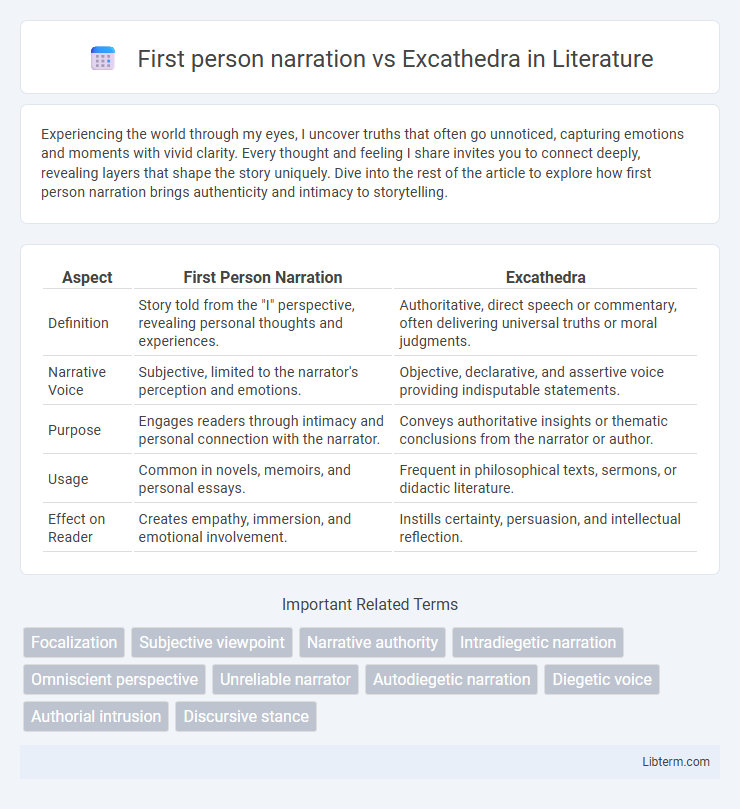Experiencing the world through my eyes, I uncover truths that often go unnoticed, capturing emotions and moments with vivid clarity. Every thought and feeling I share invites you to connect deeply, revealing layers that shape the story uniquely. Dive into the rest of the article to explore how first person narration brings authenticity and intimacy to storytelling.
Table of Comparison
| Aspect | First Person Narration | Excathedra |
|---|---|---|
| Definition | Story told from the "I" perspective, revealing personal thoughts and experiences. | Authoritative, direct speech or commentary, often delivering universal truths or moral judgments. |
| Narrative Voice | Subjective, limited to the narrator's perception and emotions. | Objective, declarative, and assertive voice providing indisputable statements. |
| Purpose | Engages readers through intimacy and personal connection with the narrator. | Conveys authoritative insights or thematic conclusions from the narrator or author. |
| Usage | Common in novels, memoirs, and personal essays. | Frequent in philosophical texts, sermons, or didactic literature. |
| Effect on Reader | Creates empathy, immersion, and emotional involvement. | Instills certainty, persuasion, and intellectual reflection. |
Understanding First Person Narration
First person narration offers a direct, immersive perspective by allowing readers to experience events and emotions through the narrator's eyes, enhancing character depth and emotional engagement. Unlike excathedra narration, which provides a detached, authoritative viewpoint delivering explicit commentary or analysis, first person narration reveals a subjective, limited understanding shaped by the narrator's biases and personal insights. Mastering first person narration involves recognizing its power to create intimacy and immediacy while accepting its inherent narrative constraints and potential unreliability.
Defining Ex Cathedra Perspective
Ex Cathedra perspective refers to a narrative stance where the narrator speaks with authoritative knowledge, presenting information as absolute and unquestionable, often reflecting a god-like or omniscient viewpoint. Unlike first-person narration, which offers a subjective and personal account through the eyes of a character using "I," the Ex Cathedra approach emphasizes definitive statements and universal truths. This style is commonly used in didactic or formal texts to convey certainty and command over the subject matter.
Historical Context of First Person Narration
First person narration gained prominence during the Renaissance as writers sought to explore individual perspectives and internal experiences, marking a shift from collective or omniscient storytelling traditions. This narrative mode allowed authors to offer personal insights and subjective viewpoints, reflecting broader cultural movements such as humanism and the rise of autobiographical literature. The historical context of first person narration reveals its role in shaping modern literary identity by emphasizing personal voice and psychological depth.
Origins and Significance of Ex Cathedra
Ex Cathedra, deriving from Latin meaning "from the chair," originates in Catholic doctrine where it signifies authoritative, infallible pronouncements by the Pope on matters of faith or morals, underscoring its significant role in defining Church dogma. First person narration, rooted in literary tradition, involves storytelling from the narrator's personal perspective, creating intimacy and subjectivity, which contrasts with the detached, authoritative tone of Ex Cathedra statements. The significance of Ex Cathedra lies in its ultimate authority and doctrinal weight within Catholicism, distinguishing it from narrative techniques focused on personal viewpoint.
Narrative Voice: Subjectivity vs Authority
First person narration offers a subjective narrative voice, immersing readers in the protagonist's personal thoughts and emotions, creating intimacy and limited perspective. Excathedra narration asserts an authoritative narrative voice, delivering information with certainty and often encompassing a broader, more objective viewpoint. This contrast highlights how subjective experience shapes storytelling in first person, while excathedra emphasizes credible, definitive knowledge.
Reader Engagement: Immersion vs Instruction
First person narration creates deep reader engagement by offering immersive, intimate access to the protagonist's thoughts and emotions, fostering empathy and personal connection. Excathedra, characterized by authoritative direct instruction, prioritizes clarity and guidance but may reduce emotional involvement and lessen immersive experience. Readers respond to first person narration with heightened emotional investment, while excathedra appeals more to those seeking explicit information and structured understanding.
Examples of First Person Narration in Literature
First person narration immerses readers in a character's perspective, as seen in classics like "The Catcher in the Rye" by J.D. Salinger and "To Kill a Mockingbird" by Harper Lee, where protagonists narrate their own experiences. In contrast, Excathedra refers to authoritative, often dogmatic declarations, typically without personal narrative involvement, common in theological or philosophical texts. The effectiveness of first person narration lies in its capacity to convey subjective emotions and intimate thoughts, offering a distinctly personal worldview.
Instances of Ex Cathedra in Communication
Ex Cathedra communication involves authoritative, declarative statements issued from a position of official capacity, often used by leaders or institutions to assert unquestionable truths. Instances include papal infallibility declarations, legal pronouncements by judges, and executive orders by authorities that carry binding power without room for debate. Unlike first-person narration, which presents subjective personal perspectives, Ex Cathedra delivers objective, formal judgments intended to guide, direct, or define doctrine and policy.
Advantages and Limitations of Each Approach
First person narration offers intimate insight into a character's thoughts and emotions, enhancing reader engagement and creating a personal connection, but it limits perspective to a single viewpoint, potentially restricting the scope of the story. Excathedra narration provides authoritative, comprehensive knowledge and objective commentary, allowing for broader context and multiple perspectives, yet it can distance the reader and reduce emotional involvement due to its often impersonal tone. Choosing between these approaches depends on the narrative's goals for subjectivity versus objectivity and the desired depth of character versus scope of information.
Choosing the Right Narrative Style for Your Purpose
Choosing between first-person narration and excathedra narration hinges on the desired level of intimacy and authority in your storytelling. First-person narration offers a personal, immersive perspective, engaging readers through the protagonist's thoughts and emotions. Excathedra narration, characterized by an authoritative, omniscient voice, provides comprehensive insight and credibility, ideal for delivering factual or instructional content.
First person narration Infographic

 libterm.com
libterm.com